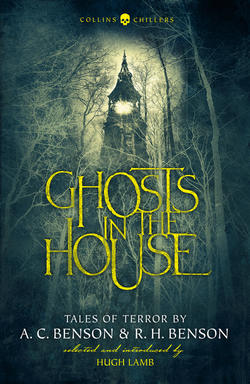Читать книгу Ghosts in the House: Tales of Terror by A. C. Benson and R. H. Benson - Hugh Lamb - Страница 11
FATHER BRENT’S TALE R.H. Benson
ОглавлениеIt was universally voted on Monday that Father Brent should tell his story and we looked with some satisfaction on his wholesome face and steady blue eyes, as he took up his tale after supper.
‘Mine is a very poor story,’ he began, ‘and, what is worse, there is no explanation that I have ever heard that seemed to me adequate. Perhaps someone will supply one this evening.’
He drew at his cigarette, smiling, and we settled ourselves down with looks of resolute science on our features. I at least was conscious of wishing to wear one.
‘After my ordination to the subdiaconate I was in England for the summer and went down to stay with a friend on the Fal, at the beginning of October.
‘My friend’s house stood on a spot of land running out into the estuary; there was a beechwood behind it and on either side. There was a small embankment on which the building actually stood, of which the sea-wall ran straight down on to the rocks, so that at high tide the water came half-way up the stonework. There was a large smoking-room looking the same way and a little paved path separated its windows from the low wall.
‘We had a series of very warm days when I was there, and after dinner we would sit outside in the dark and listen to the water lapping below. There was another house on the further side of the river, about half-a-mile away, and we could see its lights sometimes. About three miles up stream – that is, on our right – lay Truro, and Falmouth, as far as I can remember, about four miles to the left. But we were entirely cut off from our neighbours by the beechwoods all round us, and, except for the house opposite, might have been clean out of civilisation.’
Father Brent tossed away his cigarette and lit another.
He seemed a very sensible person, I thought, and his manner of speaking was serene and practical.
‘My friend was a widower,’ he went on, ‘but had one boy, about eleven years old, who, I remember, was to go to school after Christmas. I asked Franklyn, my friend, why Jack had not gone before, and he told me, as parents will, that he was a peculiarly sensitive boy, a little hysterical at times and very nervous, but he was less so than he used to be and probably, his father said, if he was allowed time, school would be the best thing for him. Up to the present, however, he had shrunk away from sending him.
‘“He has extraordinary fancies,” he said, “and thinks he sees things. The other day—” and then Jack came in, and he stopped, and I clean forgot to ask him afterwards what he was going to say.
‘Now if any one here has ever been to Cornwall, he will know what a queer county it is. It is cram-full of legends and so on. Every one who has ever been there seems to have left his mark. You get the Phoenicians in goodness knows what century; they came there for tin, and some of the mines still in work are supposed to have been opened by them. Cornish cream too seems to have been brought there by them – for I need not tell you perhaps that the stuff is originally Cornish and not Devon. Then Solomon, some think, sent ships there – though personally I believe that is nonsense; but you get some curious names – Marazion, for instance, which means the bitterness of Zion. That has made some believe that the Cornish are the lost tribes. Then you get a connection with both Ireland and Brittany in names, language, and beliefs, and so on – I could go on for ever. They still talk of “going to England” when they cross the border into Devonshire.
‘Then the people are very odd – real Celts – with a genius for religion and the supernatural generally. They believe in pixies; they have got a hundred saints and holy wells and holy trees that no one else has ever heard of. They have the most astonishing old churches. There is one convent – at Lanherne I think – where the Blessed Sacrament has remained with its light burning right up to the present. And lastly, all the people are furious Wesleyans.
‘So the whole place is a confusion of history, a sort of palimpsest. A cross you find in the moor may be pagan, or Catholic, or Anglican, or most likely all three together. And that is what makes an explanation of what I am going to tell you such a difficult thing.
